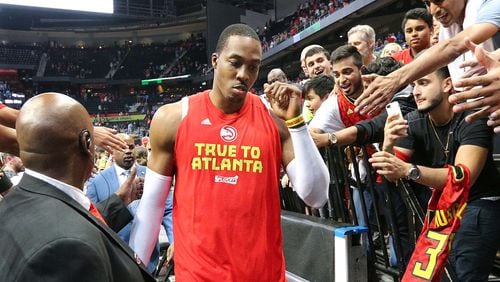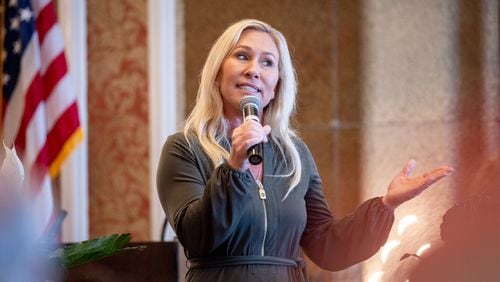Nine months ago, when the Hawks hung the “Welcome home” sign and Dwight Howard got all choked up at a news conference and Mike Budenholzer said, “I can’t say how right the timing feels,” some were deluded into believing this could work.
But we just witnessed a full basketball season of evidence to the contrary.
The Hawks’ offense didn’t work this season. The on-floor chemistry never developed. Budenholzer, who was most responsible for bringing Howard here, came to the conclusion his team was better with Howard on the bench. He reduced the player’s minutes down the stretch of the season, when the Hawks were trying to stop wobbling, and benched him for the entire fourth quarters of two playoff games.
So. Welcome home?
Howard is not happy. The day after the Hawks were drop-kicked into the offseason by Washington, he used the word “pissed” three times to describe his feelings about the way both his and the team’s the season ended.
“It was very difficult,” Howard said Saturday. “I want to play. I want to be out on the floor. I want to make a difference. I want to make an impact, and I can’t do that on the bench.”
He denied suggestions that matchups should have anything to do with his reduced time. He denied season-long suspicions that he struggles in the Hawks’ ball-movement, pick-and-roll offense. Physically, he said he feels “amazing.” Mentally, that’s another story.
After sometimes avoiding speaking to the media following games this season, Howard responded to every question Saturday, even if not always going into great detail. He made it clear he was upset and didn’t deny that his dramatically reduced role was not in the blueprint presented to him before he signed as a free agent.
So yes, player and coach will need to have a conversation.
“That’s something that we have to talk about,” he said. “I can’t give you details here.”
Is it safe to say your role wasn’t what was laid out to you before signing?
“I’ll let you say that. I just want to get ready for next year.”
When it was suggested he was biting his tongue, Howard said, “I just want to get ready for next season.”
Howard was the centerpiece of Budenholzer’s offseason makeover. But in the playoffs he somehow evolved into the equivalent of a gravy boat — a seldom-used piece on the roster. He played in just over 16 of a possible 72 minutes in the fourth quarters of six playoff games against the Wizards.
“It hurts,” Howard said. “I’m sure if you wrote the best stories in the world and nobody read your stories and they told you to stop writing and you saw somebody else’s story that wasn’t as good as yours, I’m pretty sure you’d be pissed, too. That’s how it is in basketball.”
Let’s make something clear here. While I was not in favor of the Hawks’ signing Howard and the organization making that a higher priority than bringing back Al Horford, the center should not be blamed for this disappointing season. Howard performed exactly how anybody should have expected he would. He’s 31 years old and he was in his 13th season.
He can still be a dominant rebounder. But he’s not a dominant post player and he should never have been expected to operate in the Hawks’ ball-movement offense as fluidly as Horford. The fact this was Dennis Schroder’s first season as a starting point guard, and he was still a bit of a wild hair, also presented challenges when it came to incorporating Howard.
Howard wants to win. But he’s also never been known as a “bonding” element on the floor or in a locker room. This makes five of the past six seasons — with Orlando, Los Angeles, Houston and Atlanta — that his team didn’t make it past the first round of the playoffs
What happened this season is not on Howard — it’s on Budenholzer and general manager Wes Wilcox. They misfired with their expectation level of Howard’s impact. When Budenholzer said the timing was right, he could not have been more wrong.
Now the Hawks are stuck. They have to make this work. Howard likely will be back next season, if only because he has two years and more than $47.3 million left on his contract. Another team will not pay that for a really good rebounder.
Budenholzer, the coach, is determined to make Budenholzer, the executive look good. Besides, Budenholzer, the executive, has enough other problems: 1) convincing Paul Millsap to re-sign; 2) determining the right contract and role for Tim Hardaway Jr.; 3) finessing a role for Kent Bazemore, who already got his big contract, but missed too many shots and committed too many turnovers to stay in the starting lineup.
Budenholzer said putting on the bench was “difficult,” but reiterated there were times the team needed to play “a little faster” and “more spread. … There’s still a feeling out as to how you play and how you function with him.”
Budenholzer and Howard will clear the air over lunch in the next week or two, the coach said. But he doesn’t believe the team’s offensive problems all fall on the center.
“It’s not just about Dwight,” Budenholzer said. “I understand the questions, I understand Dwight’s frustrations. But offense is about five guys, and Dwight brings a lot to the table that can help us be a good offensive team. All of us have to figure out how to make it better.”
The kid from Southwest Atlanta Christian Academy is no longer a kid. He’s near his career finish line.
“I didn’t come back here just to come back home. I came here to win,” he said.
Maybe it can still work. Or maybe he and the Hawks are fooling themselves. Evidence seems to point to the latter.
About the Author






